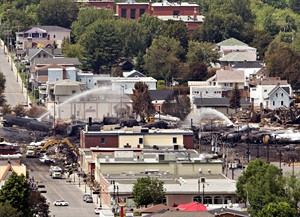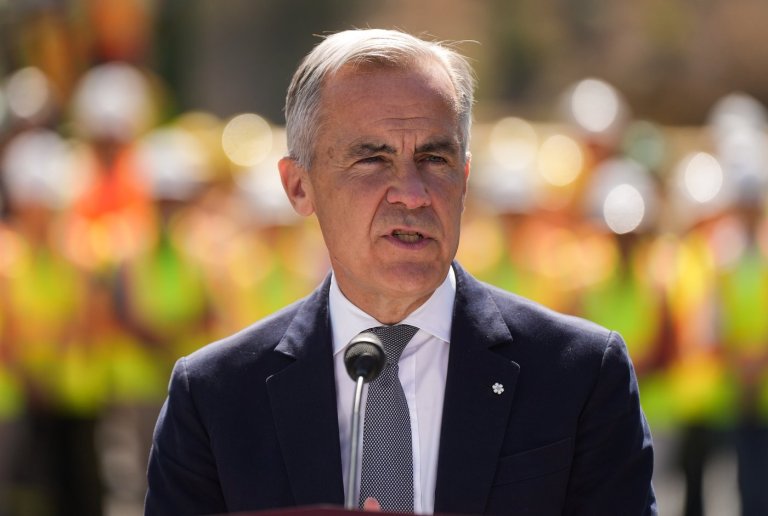
Questions surface about integrity of tanker cars in Lac-Megantic disaster
LAC-MEGANTIC, Que. – A Quebec town devastated by a deadly tanker-train derailment is expecting a visit from the head of the U.S. rail company at the centre of last Saturday‘s disaster.
It was unclear, however, when Edward Burkhardt would arrive, but his absence in the community since the explosion hasn’t gone unnoticed and he is certain to face tough questions and a fair degree of anger when he does visit.
The community about 250 kilometres east of Montreal was ravaged after an unattended train rolled in and exploded into balls of fire, killing at least 13 people and leaving nearly 40 more missing.
The rail tankers involved are known as DOT-111 and have a history of puncturing during accidents, the lead Transportation Safety Board investigator said in a telephone interview late Monday.
Donald Ross told The Associated Press the TSB is on record saying that it would like to see improvements on these tankers, though he said it was too soon to know whether a different or modified tanker would have avoided the tragedy.
Flaws in the DOT-111 have been noted as far back as a 1991 safety study. Among other things, its steel shell is too thin to resist puncturing in accidents, which almost guarantees the car will tear open in an accident, potentially spilling cargo that could catch fire, explode or contaminate the environment.
Burkhardt was quoted in Montreal’s La Presse newspaper as saying a different type of tank car wouldn’t have made a difference in the tragedy.
“I can’t imagine a tank car that’s solid enough to withstand what happened here,” he said.
But as questions surface about the integrity of the tanker cars in an accident, the rail company and the fire department in the nearby town of Nantes appear to be pointing the finger at each other as investigators search for causes in the tragedy.
The fire chief in Nantes has offered an assessment different from the Montreal, Maine & Atlantic Railway about who might have been to blame in the hours leading up to the tragedy.
Patrick Lambert said his crew had been trained by MMA to handle fires on its line — and they intervened to fight four fires on MMA trains in the last eight years.
He said his firefighters had shut off the engine to battle a blaze on the train earlier Friday night, as the MMA operating procedure urged them to do. After extinguishing the fire, he said his crew received the company’s blessing to leave the scene.
The company, however, said the fire crew should have alerted the engineer who by that point had gone home to sleep for the night.
With the fire crew gone, and the engineer in bed, the train began rolling downhill on a fateful, destructive journey.
Authorities have said they’re investigating such procedural details as well as the possibility of other factors having been at play, as part of their criminal probe.
Transportation Minister Denis Lebel, who arrived in the town Monday afternoon, says it’s too early to speculate about what or who may be to blame, given that the TSB hasn’t finished its investigation, nor have Quebec police.
But he chided the Montreal, Maine & Atlantic Railway for how it has handled the catastrophe, saying he has “asked them to have a better communication system with the community and with the government.”
Burkhardt has been quoted in news reports as saying he’s received many hateful messages and that he hopes he doesn’t get shot at when he visits Lac-Megantic, because he doesn’t plan to wear a bullet-proof vest for his visit.
But even before he arrives, some residents have strong words for Burkhardt.
Richard Poirier, who was forced out of his home in Notre-Dame-de-Fatima, says he can’t accept that the company has been so absent.
“I don’t understand. I don’t think it’s right,” he said. “They’re not present at all.”
Others, such as Raymond Lafontaine — whose son, two daughters-in-law and employee disappeared in the blast — urged the railway president to take a second look at his operations to ensure they meet safety regulations.
Lafontaine said he doesn’t want dangerous material rolling through his town anymore. “It’s an atomic bomb, it’s dangerous,” he said.
He fears unregulated trains will kill more people’s children.
“Today, it’s me,” he said.
“It’s our town that is half-gone.”
Locals have been quick to single out the company with complaints about its lack of visibility, its safety standards, and even the fact that a press release issued in French appeared sloppily translated and loaded with errors.
The manager of the Musi-Cafe bar, who lost friends and colleagues in the explosions, said Monday that her own anger is directed at the company.
“Enormously,” said Sophie L’Heureux, who added that security procedures are clearly inadequate.
She believes the railway has been laying low since the incident because it knows it did something wrong.
— With files by Andy Blatchford and The Associated Press
Join the Conversation!
Want to share your thoughts, add context, or connect with others in your community? Create a free account to comment on stories, ask questions, and join meaningful discussions on our new site.




















Leave a Reply
You must be logged in to post a comment.